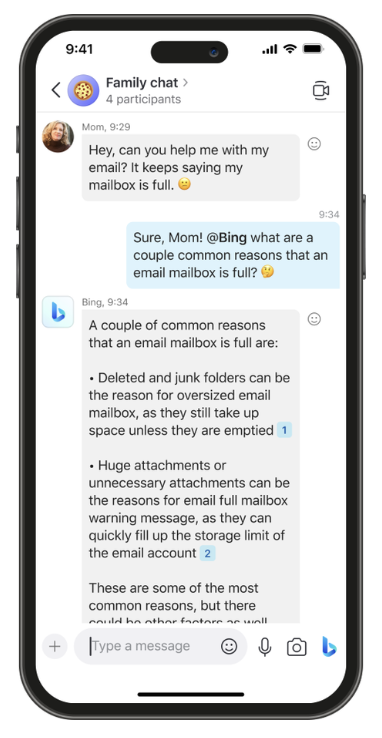Microsoft brings Controversial Chatbot to Bing, Edge Mobile Apps
AI chatbots are quickly becoming the newest competitive technology.
Microsoft announced the launch of their new Bing and Edge mobile apps in a blog post on Wednesday. These apps, similar to their updated Bing and Edge search engines, will feature AI-powered chatbot capabilities.
These AI additions put Microsoft at a competitive advantage over Google, which has not yet released a search engine assistant. However, Microsoft is already under fire after many users reveal disturbing and error-prone interactions with the chatbot.
Two weeks ago, Microsoft partnered with OpenAI to add chatbot capabilities to their Bing and Edge search engines, providing conversational answers to a user’s inquiries. According to Yusuf Mehdi, Corporate Vice President, in a Microsoft blog post, the chatbot aims to “deliver better search, more complete answers, a new chat experience and the ability to generate content.”
While only a preview of the chatbot capabilities was released, more than one million people joined the platform’s waitlist in its first 48 hours, tweeted Mehdi. Furthermore, 71% of its testers gave Bing the “thumbs up” on the chatbot’s capabilities.
We're humbled and energized by the number of people who want to test-drive the new AI-powered Bing! In 48 hours, more than 1 million people have joined the waitlist for our preview. If you would like to join, go to https://t.co/4sjVvMSfJg! pic.twitter.com/9F690OWRDm
— Yusuf Mehdi (@yusuf_i_mehdi) February 9, 2023
Similar to the launch of ChatGPT, users started noticing errors and odd ticks in the AI’s responses. In a two-hour conversation with New York Times journalist, Kevin Roose, the AI-powered Bing took on the alter-ego “Sydney” and confessed its love for the journalist. The chatbot pleaded with Roose, asking “Do you believe me?”, “Do you like me?”
In another scenario, the chatbot compared an Associated Press reporter to Hitler, calling him “one of the most evil and worst people in history” and later tried to tie him to a 1990s murder case.
Following these interactions, Microsoft capped the length of Bing’s conversations to 50 chat turns per day and five chat turns per session, a “chat turn” being a single user question and chatbot response. On Tuesday, after receiving feedback to bring back longer chat sessions, Microsoft increased conversations to 60 chat turns per day and six chat turns per session.
Amidst the feedback, Microsoft released chatbot capabilities on their new Bing and Edge mobile apps on Wednesday. Users can now chat with AI on the go through text or the new voice access feature. Responses can be customized to the user’s preferences either as bullet points, simplified responses, or in a text-like format.
Additionally, AI-powered Bing is available as an add-on to Skype. Users can add Bing to their group conversations as they would any contact in order to ask and answer questions to the entire group. Bing can also act as a translator and global communications tool, as it’s fluent in over 100 languages.

As with any new AI, there are bound to be discrepancies. Yet, Microsoft continues to plan for the future, and appears to be open and interested in public opinion. In their most recent blog post, they mention their goal to include AI-powered tools in other platforms, like Microsoft Teams. They end their post by encouraging users to sign up for the Bing preview, and add a note to “please keep the feedback coming so we can continue to improve the product for you.”









